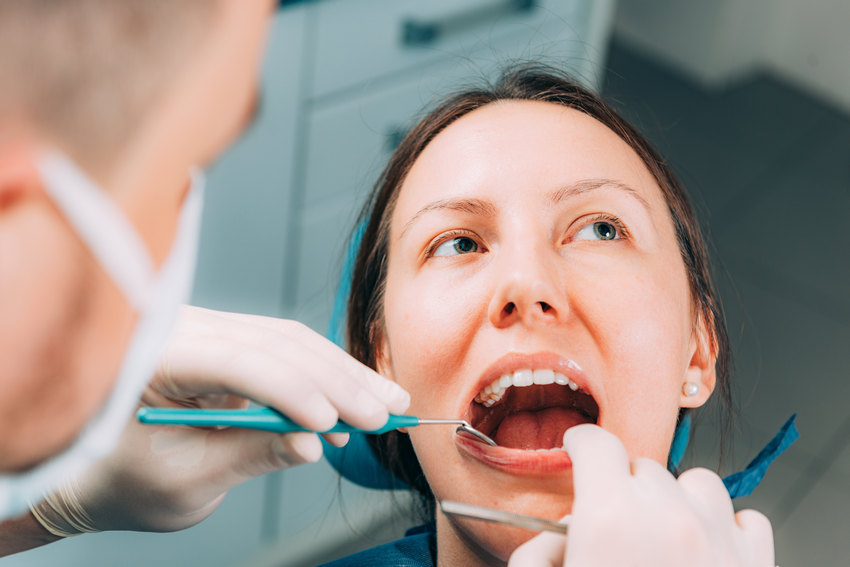
You don’t have to be a dental professional to know what’s going on with your oral health: you can maintain a solid grasp of the status of your mouth by looking for the clues left behind by your teeth and gums. Even the appearance of your tongue can give you signs as to the general health of your mouth. Your tongue should be a soft pink and will be covered in small nodules (these are called papillae). If your tongue doesn’t look like this, there could be something amiss that may or may not be hazardous to your health. Knowing what to look for, and why your tongue might look the way it does, is one way to keep on top of your health and stay in-the-know.
Your tongue has turned red.
A number of things may have happened if your tongue takes on a reddish appearance. You might be vitamin deficient, specifically in folic acid or vitamin B-12. You might also have geographic tongue, a condition which gives your tongue a reddened, “map-like” quality. Geographic tongue is generally harmless and not cause for serious concern, but talk to your dentist if your tongue takes on these map-like marks. If your tongue turns red and bumpy, not unlike the appearance of a strawberry, then something more harmful could be happening. You might have scarlet fever, a rather serious infection that will need to be treated with antibiotics. Kawasaki disease is also indicated by a red, strawberry-like tongue. This very serious syndrome manifests in children under the age of five and requires immediate medical evaluation upon discovery.
Your tongue has a white coating or is covered in white patches.
White on your tongue can mean a lot of different things. If there are white lines on your tongue that take on an almost lacey appearance, don’t fret: this is oral lichen planus, and while dentists don’t really know what causes it, it usually clears up on its own. Larger white patches on the tongue and inside of your mouth could be a sign of leukoplakia, which is also not inherently dangerous. But be warned: leukoplakia is a precursor to cancer. It’s frequently found in the mouths of tobacco-chewers. If this is you, and you discover white patches on your tongue, don’t hesitate: get to a dentist or medical professional immediately to assess your overall health.
Finally, a white tongue (particularly with patches that take on the look of cottage cheese) could be a sign of oral thrush. Oral thrush is most often found in seniors who use dentures, in young infants, or those with weakened immune systems; it also has a tendency to crop up if a person has been taking antibiotics. Oral thrush is a type of yeast infection, and while it’s not particularly severe, you should still talk to your dentist if your tongue has taken on this “cottage cheese” look.

Your tongue has a black, almost “hairy” appearance.
A hairy tongue? Don’t worry, that’s not actually hair growing on your tongue. Remember those little nodules, the papillae? These grow throughout a person’s lifetime, and in some cases, they can grow unusually long. Longer papillae can harbor more bacteria than normal, and bacterial growth on a tongue can look like dark hair to the naked eye. This is not a common situation and it’s really not dangerous: mostly it’s an indication of poor oral hygiene. So if you sense that your tongue might be looking a little hairy, just get back to brushing!
Your tongue is bumpy or sore.
Physical damage to the tongue can manifest itself in bumps or scrapes. If you burn your tongue on a hot beverage, bite your tongue, or grind your teeth against the sides of your tongue, it may appear marred or scratched. The same appearance can also occur if you smoke, or if you’re prone to canker sores. However, if a bump on your tongue does not resolve itself over a period of a few weeks, you should have it examined by your dentist: a bumpy tongue can also be an indication of oral cancer, even if there’s no associated soreness or pain.
Keeping track of the status of your teeth, gums and tongue is always important, so be sure to pay attention in the morning to what your tongue looks like and how your mouth feels. And remember: if you ever have questions or concerns about the feel or appearance of your tongue, come talk to the professionals at Absolute Smile. They’re here to help you understand your oral health and keep potential dangers and hazards at bay.






